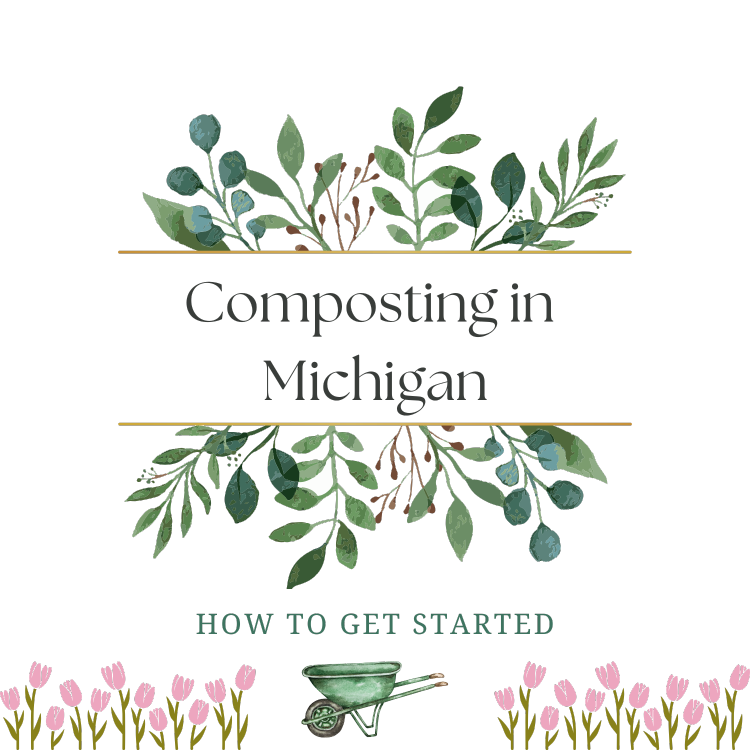Introduction
Homesteading, living off the grid, recycling, and thrifting have been slowly creeping in to replace the outdated, outdone idea of maximized materialism. In a world where it's easier to buy affordable cannabis in-store and eggs at your local neighbor's, society is struggling just to stay afloat each day.
Enter composting. Yes, you've likely heard of composting in the past. Maybe you put it in the back of your mind as something "those weirdo hippies" or "farmers" do, but it's actually much more than that.
As the world shifts, composting will become even more popular—especially with all of its benefits. As our soil demands more nutrients and fails to deliver healthy harvests, are we destined to find our way back to living "off the land", even if that's in our own backyards?
Composting helps enrich soil (which we desperately need), reduces food waste (which we all mostly loathe), and offers an opportunity towards sustainable living. In Michigan, and the rest of the Midwest, we're all too familiar with the ebbs and flows of nature. The unpredictable seasons.
From living in an upscale city-dweller's apartment to a traditional suburban home, getting started with composting is easier and more accessible than you might think.
Types of Composting Systems to Build in the Midwest (particularly in Michigan)
During the warmer months (think spring and summer), the following composting solutions are best:
- Wood pallet bins: Old pallets you no longer need? Using wooden pallets is a great way to create breathable composting bins. They're ideal for spring and summer, as they may freeze during the winter. You can often find pallets at local home improvement stores or by searching Facebook Marketplace. Many people give them away free of charge!
- Stationary plastic composting bins: From traditional garbage cans to large unused storage bins, these are easy and budget-friendly. Bonus: they retain heat better than open wooden bins.
- Tumbling bins: Tumbling bins are designed for composting and are ideal for beginners. They’re quick to set up, sealed from pests, and easy to rotate.
For winter composting:
- Vermicomposting (worm bins): Indoor composting bins with red wiggler worms work year-round and are perfect for basements or mudrooms.
- Bokashi Systems: These indoor, fermentation-based systems can even handle small amounts of dairy and meat. Great for apartment dwellers.
- Scrap containers: Use old plastic containers with lids to collect kitchen scraps before transferring them to your main bin. A practical, no-cost solution.
"Producing quality compost is the most important job on the organic farm. A lot of the problems I see on farms I visit could be solved by making better compost."
What You Can and Can't Compost
Can Compost
These nitrogen-rich "green" materials are ideal:
- Fruit and vegetable peels and scraps
- Tea bags (unbleached, no staples)
- Grass clippings
- Plant trimmings
- Coffee grounds
For carbon-rich "brown" materials:
- Dried leaves
- Shredded newspaper
- Cardboard (non-coated)
- Paper towels
- Sawdust (from untreated wood)
Do Not Compost
Avoid these pest-attracting or contaminating items:
- Dairy products
- Meat and bones
- Oily or greasy food waste
- Diseased plants
- Plastic-coated packaging or synthetic materials
How to Contribute to Your Composting Bin(s)
Use a 2–3 parts brown to 1 part green ratio. Layer your compost with alternating brown and green materials.
Turning your compost pile regularly adds oxygen and speeds up the process. According to the Berkeley Method, compost can be ready in just 18 days if turned frequently and properly balanced.
Use a compost fork or aerator tool to mix materials efficiently.
How Long Will It Take for Compost to Become Usable?
Compost can be ready in 2 to 6 months depending on temperature, material balance, and how often it's turned. Finished compost will appear dark, crumbly, and have an earthy smell.
What Can I Use My Composted Materials For?
- Garden soil enrichment
- Lawn topdressing
- Fertilizer for flower beds, vegetables, or fruit trees
- Potted plant enhancement
Whether you're composting coffee grounds and vegetable scraps or dried cannabis leaves and garden clippings, composting is a practical solution for sustainable living in Michigan.
